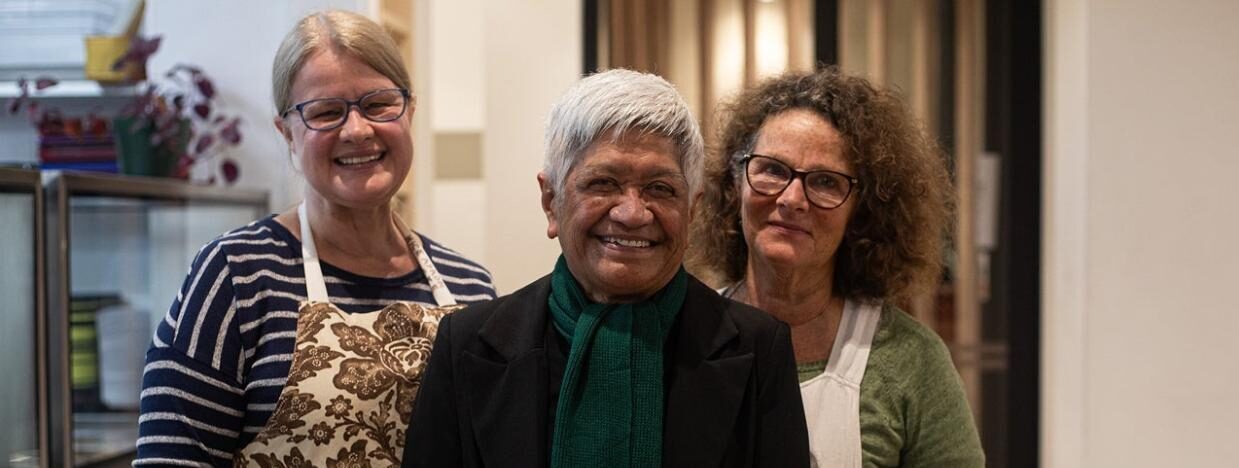
Monday 9 October 2023
The Wāhine Dinner helping homeless women find community
Every Tuesday evening in central Auckland, a group of women come together. Some are seeking shelter and warmth, others safety and a hot meal or just some like-minded company.
Lechelle, a mother of five, has been coming to these dinners for the last three years. “It’s all about the free food,” she says, as she makes her way over to the already laid table.
A small black radio booms out popular hits from the corner of the room as young women chat nearby. Every so often one breaks out into laughter.
Spread out across a large dining hall, tables are neatly decorated with pink and white roses. The colours symbolise happiness and joy – emotions not often felt by those desperately in need of shelter, says Lechelle.
As she cautiously takes a seat, Lechelle tells Sunday she has “lived it all”.
“I know what It’s like to be on both sides of the fence. My life went to shit about three years ago, and I turned to alcohol and drugs as a distraction.
“I’ve been out there homeless, and I’ve come here because I needed somewhere to eat and to just feel safe, even if that’s for a short period of time.”
By international standards, a disproportionately high number of New Zealand’s unhoused population are women. Last census data revealed women account for about 50.5% of Aotearoa’s overall homeless population.

Kirsten Sloan preparing food for the dinner.
Each week, Auckland City Mission hosts a dinner for these women. Volunteers prepare and serve the dinner, an effort shared between Te Miringa Trust, a group of women who support wāhine experiencing homelessness, and wāhine living at the City Mission’s kaupapa Māori service, Te Whare Hīnātore.
Food is one of the key priorities when living out on the streets, Lechelle says.
“It was all about the free food and this Wāhine Dinner was always the most consistent. The food is way better here than at most places.”
On this particular Tuesday, meatloaf and roast potatoes with a side of coleslaw and garlic bread is on the menu.
Lechelle volunteers every week and says although she is “pretty good” in the kitchen, she prefers doing the “prepping and the clean-up”.
“I come in every Tuesday and volunteer, and so I still keep in touch with a lot of the people that I met out on the streets. It keeps me humble, because it’s easy to become ungrateful. We’re all one bad choice away from being lost.”

“We’re all one bad choice away from being lost.”
Her favourite part of attending the dinners, aside from the free meals, is being around people with similar circumstances who understand her plight.
“It’s just good being around people that don’t judge you, and they understand because the system sucks. They try to place us into boxes that don’t fit.
“But here, It’s safe and non-judgemental. It doesn’t matter where you’re from. I came here looking for a free meal and ended up getting help with addiction and accommodation.”
Now living in transitional housing provided by the Auckland City Mission, Lechelle is enrolled in a mental health and wellbeing course, and is looking forward to helping others in the community once she graduates.
“I’m quite content where I am. It’s a safe place away from a lot of the crap out there. But I know it’s not my forever home, so when I do leave, I want to work in the community. I feel humble being around people like this.”

Food is one of the key priorities when living out on the streets.
To the right of Lechelle, a queue has formed. About 12 women of all ages have lined up at the back of a door leading to the terrace. There’s a sudden cry of “woohoo!”
The reasoning behind the outburst becomes clear moments later when a large clothing rack is unveiled with a mix of trousers, t-shirts, blouses and underwear. One by one, the women take turns picking out the different garments.
Joanne Reidy, the mission’s general manager Māori, explains the clothing has come from non-profit organisation, Koha Apparel.
“Clothing is a fundamental human right but, in reality, not everyone has equal access,” Reidy says.
“They [Koha Apparel] provide clothing for our wāhine, and it’s a real treat for them that they get to go out and try on something. There’s a feeling of joy that comes with it that most women can relate to.”
She says the issue of women’s homelessness is invisible in Aotearoa, with services and policies not always inclusive of all genders.

The idea of a women-only space was developed around wanting to create a sense of community, because women who are suffering homelessness, are also experiencing a “deep” sense of “loneliness and isolation”.
“It’s quite a heavily male dominated space which can sometimes be unintentional. In the mornings for example, we have about 300 people a day coming in for a meal and the majority are men.
“We recognised we needed to tailor our service because the way men and women congregate and communicate is so much different.”
Auckland City Missioner Manutaki Helen Robinson says despite the high rates of homelessness amongst Aotearoa’s wāhine, the support systems are primarily designed for men.
“When we had our old detox unit on Federal Street, we were horrified to find out there were many women who weren’t accessing our services because they didn’t feel safe,” says Robinson.
“A lot of these women are coming from very traumatic spaces where they were abused in many different ways, which meant being around men was really uncomfortable for them. So, we decided we should start offering a service every week for only people who identified as a woman.
“The first night we opened the doors, there were less than 10 people here. Over the last three or four years since its inception, we’ve had up to 70.”
Robinson says the idea of a women only space was developed around wanting to create a sense of community, because women who are suffering homelessness, are also experiencing a “deep” sense of “loneliness and isolation”.
“You can just feel the lovely energy in the room. It’s quite low-key, but incredibly important. It just proves there really is a need for women to be responding to the needs of other women, particularly when women are suffering deeply.”
This article was written by Mildred Armah for Sunday Magazine. Photographs by Caroline Williams.
